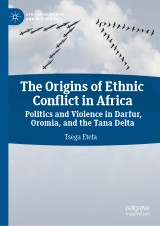Details

The Origins of Ethnic Conflict in Africa
Politics and Violence in Darfur, Oromia, and the Tana DeltaAfrican Histories and Modernities
|
90,94 € |
|
| Verlag: | Palgrave Macmillan |
| Format: | |
| Veröffentl.: | 01.02.2019 |
| ISBN/EAN: | 9783030105402 |
| Sprache: | englisch |
Dieses eBook enthält ein Wasserzeichen.
Beschreibungen
From Darfur to the Rwandan genocide, journalists, policymakers, and scholars have blamed armed conflicts in Africa on ancient hatreds or competition for resources. Here, Tsega Etefa compares three such cases—the Darfur conflict between Arabs and non-Arabs, the Gumuz and Oromo clashes in Western Oromia, and the Oromo-Pokomo conflict in the Tana Delta—in order to offer a fuller picture of how ethnic violence in Africa begins. Diverse communities in Sudan, Ethiopia, and Kenya alike have long histories of peacefully sharing resources, intermarrying, and resolving disputes. As he argues, ethnic conflicts are fundamentally political conflicts, driven by non-inclusive political systems, the monopolization of state resources, and the manipulation of ethnicity for political gain, coupled with the lack of democratic mechanisms for redressing grievances.<p></p>
1. Ethnicity as a Tool: The Root Causes of Ethnic Conflicts in Africa: A Critical Introduction.- 2. From Inclusion to Exclusion: Marginalization across Nations.- 3. Precursors to Violence: Neglect and Politics in Darfur, Oromia, and the Tana Delta.- 4. Across Borders: Local Governance and Regional Implications.- 5. When Neighbors Become Killers: From <i>Murahaleen</i> to <i>Janjaweed</i> in Darfur.- 6. From Jebel Marra to Blue Nile: Violence in Darfur and Oromia.- 7. Neither <i>Malkas</i> nor <i>Shambas</i>: Oromo and Pokomo Conflict, 1991–2013.- 8. Tolerance under Siege: African Principles of Conflict Resolution.- 9. Managing Conflict in Africa: Workable Solutions and Recommendations.<p></p>
<b>Tsega Etefa </b>is Associate Professor of History and Africana and Latin American Studies at Colgate University, New York, USA.
From Darfur to the Rwandan genocide, journalists, policymakers, and scholars have blamed armed conflicts in Africa on ancient hatreds or competition for resources. Here, Tsega Etefa compares three such cases—the Darfur conflict between Arabs and non-Arabs, the Gumuz and Oromo clashes in Western Oromia, and the Oromo-Pokomo conflict in the Tana Delta—in order to offer a fuller picture of how ethnic violence in Africa begins. Diverse communities in Sudan, Ethiopia, and Kenya alike have long histories of peacefully sharing resources, intermarrying, and resolving disputes. As he argues, ethnic conflicts are fundamentally political conflicts, driven by non-inclusive political systems, the monopolization of state resources, and the manipulation of ethnicity for political gain, coupled with the lack of democratic mechanisms for redressing grievances.
Offers a comparative study of three armed ethnic conflicts in three East African countries, in order to deepen our understanding of the political and transnational dimensions of ethnic conflict Argues that poor political governance and misuse of power by elites, rather than resource competition, ethnic diversity, or climate change, are the most fundamental causes of internal ethnic conflict Suggests political solutions to mitigate armed conflicts in Africa
Diese Produkte könnten Sie auch interessieren:

Deportationen aus der Westukraine von 1947-1952 und die ukrainische Nationalbewegung

von: Julia Ramchen

18,99 €
















